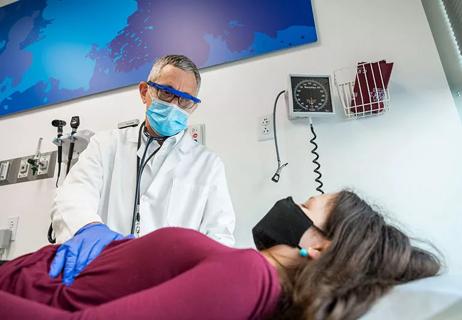What you need to know to enjoy safe, good results from plastic surgery

Whether you’re interested in a face-lift, cosmetic nose surgery, liposuction, reconstructive surgery following mastectomy or some other procedure, there’s a plastic surgeon for that. The right surgeon will have the skills and experience to do safe, aesthetically pleasing work. On the flip side, the wrong surgeon could cause you harm.
Advertisement
Cleveland Clinic is a non-profit academic medical center. Advertising on our site helps support our mission. We do not endorse non-Cleveland Clinic products or services. Policy
Plastic and reconstructive surgeon Graham Schwarz, MD, goes over the five things you should look for when you’re selecting a plastic surgeon:
When shopping around for a plastic surgeon, look for someone who has become board-certified in plastic surgery by the American Board of Plastic Surgery.
“This means the surgeon has had at least six years of surgical training with two or three years devoted specifically to plastic surgery, has passed rigorous oral and written examinations and has demonstrated safe and ethical surgical practice,” says Dr. Schwarz.
Plastic surgery is viewed as an art form in the medical world and doing your homework can be the difference between getting the results you want and being unsatisfied with the work.
Plastic surgery is often performed in an ambulatory care center or the surgeon’s office-based surgical facility. Either way, you want to make sure the facility is properly accredited, just like making sure the surgeon is board certified. Accreditation ensures that strict standards are met for proper equipment, safety, surgeon credentials and staffing.
But how can you tell that a facility is accredited? Look for these accreditations:
Advertisement
Accredited facilities are required to have less than half of 1% of serious complications and an extremely low mortality rate of less than one in 57,000. When you choose an accredited facility, you’re also choosing to receive the best quality care available.
Surgeons are doctors who should be treating you holistically. They should take into account your medical history even if you’re seeking a cosmetic procedure.
“Whether it’s cosmetic surgery or reconstructive surgery, if the surgeon isn’t asking you about your medical history and taking that into account when discussing potential treatment options, it should be a red flag that they’re not being thorough,” says Dr. Schwarz.
If a surgeon is trying to oversell – suggesting procedures you didn’t ask for or procedures with benefits you can’t understand after an explanation – then that’s a red flag.
Some procedures may complement or enhance other procedures, such as cosmetic nose surgery (rhinoplasty) and chin augmentation. However, if you’re asking about rhinoplasty and the surgeon is talking about liposuction of your thighs, then you may want to find another surgeon who will better listen to and address your needs.
“Ideally, you want to find a surgeon who will work with you to define your goals and provide you with realistic expectations for your cosmetic or reconstructive surgery,” says Dr. Schwarz.
You should feel a partnership between you and the surgeon. While complications are not common, you should feel comfortable that, if something unexpected arises, this surgeon will take care of you. You may not want to move forward if you don’t feel a high degree of trust.
Be prepared to ask yourself questions like:
With careful research and an understanding of your own wants and needs, you’ll be prepared to find the right plastic surgeon for you.
Advertisement
Learn more about our editorial process.
Advertisement

The differences are few, but ophthalmologists can perform eye surgeries and more complex procedures

You don’t have to wait until you have symptoms of heart disease to seek cardiology care

Having a PCP means knowing where to go for a range of concerns — that’s a good thing for your lifelong health

Anyone can call themselves a nutritionist, but dietitians have specialized training

The best way to figure out which kind you need is to first speak with your primary care provider

They practice medicine similarly, but DOs have a focus on the mind, body, spirit connection

The short answer from a primary care specialist

The Short Answer from one of our experts

Wearing a scarf, adjusting your outdoor activities and following your asthma treatment plan can help limit breathing problems

Your diet in the weeks, days and hours ahead of your race can power you to the finish line

When someone guilt trips you, they’re using emotionally manipulative behavior to try to get you to act a certain way